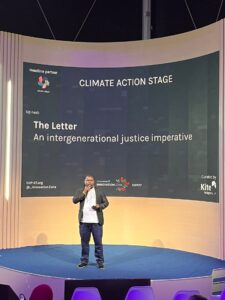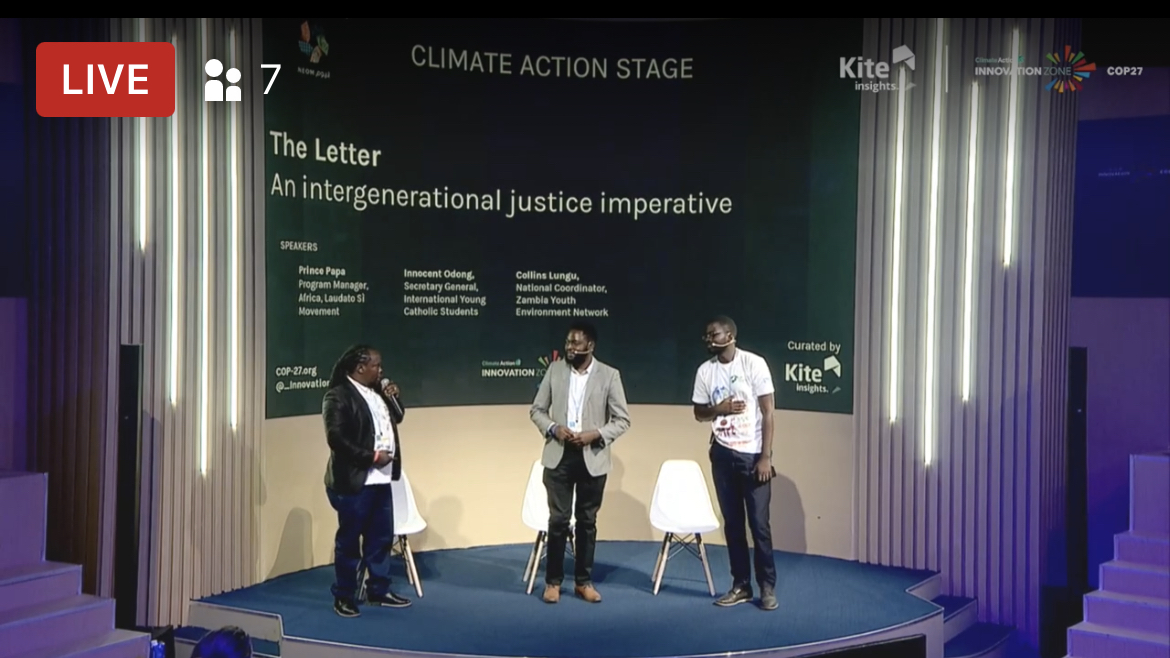The movie has a prophetic message. Six protagonists from across the globe gather together to discuss the environment with Pope Francis—the protagonist Arouna in particular emphasizing the tragic loss from sea level rise and climate migration from Senegal to Europe. The 2022 film release of The Letter: A Message for Our Earth shared such scenes at COP27 at the Climate Action Stage in Tonino Lamborghini Hotel on 17 November 2022.For many the film has been a wake up call to the injustices facing the environment. For moderator Prince Papa, Laudato Si’ Movement’s Africa Program Manager, the film’s appeal had to do with following Arouna’s footsteps and the question: should Africans remain in Africa?
Informed by his work as National Coordinator for the Zambia Youth Environment Network, panelist Collins Lungo explained climate migration injustices include the loss of biodiversity in response to development needs in Zambia. Lungo shared, “last farming season we saw an insect migration…we saw hundreds of hectares being devastated by locusts” and as a result, “We are seeing more people encroaching into forest preserves” at the expense of the animal communities who live in these lands.

Prince Papa, Laudato Si’ Movement’s Africa Program Manager, launches the discussion for the film.
That persistence of forced climate migration struck Innocent Odongo, Secretary General for International Young Catholic Students. Odongo offered his impression from his experience growing up in Uganda: “I think putting myself in the shoes that Arouna is walking…I experienced a similar situations going to 10 kilometers each morning to fetch water…If I think about it in terms of poverty…it [climate change] leaves them [youth] with no option…You either go to Barcelona or you die.”
Informed by his work as National Coordinator for the Zambia Youth Environment Network, panelist Collins Lungo explained climate migration injustices include the loss of biodiversity in response to development needs in Zambia. Lungo shared, “last farming season we saw an insect migration…we saw hundreds of hectares being devastated by locusts” and as a result, “We are seeing more people encroaching into forest preserves” at the expense of the animal communities who live in these lands.
That persistence of forced climate migration struck Innocent Odongo, Secretary General for International Young Catholic Students. Odongo offered his impression from his experience growing up in Uganda: “I think putting myself in the shoes that Arouna is walking…I experienced a similar situations going to 10 kilometers each morning to fetch water…If I think about it in terms of poverty…it [climate change] leaves them [youth] with no option…You either go to Barcelona or you die.”

The panelists stand and receive applause and gratitude from the audience and those who viewed the event on its livestream service.
For Luongo part of the reason the film and the COP27 event is so compelling is because it offers a platform for hope: “I want to speak as a voice for hope because many young Africans are in despair. But there are young people who are willing to do so much.” Luongo emphasized, “The only thing they are lacking is the financing we are demanding here at the COP27.”
“We won’t have to cry for the future generations that are coming,” Luongo concluded. “Africa will be a place we can call home.” The film screening and event, which followed two weeks of discussions on the Climate Action Stage at COP27, concluded with a round of applause for all panelists and the film itself.


0 Comments